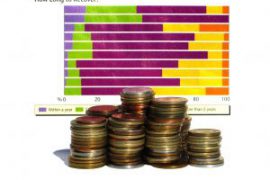Some savings accounts are specifically designed to allow you to make regular monthly deposits. While you can use a normal account to do that, the difference is that a regular savings account, sometimes called a monthly saver, generally comes with a higher, fixed rate for the term – which is usually a year.
In return, you must stick rigidly to the account’s conditions or you may be penalised with the loss of some or all of the interest. This often means making a deposit of between £25 and £250 every month and not making any withdrawals until maturity.
Terms can vary from account-to-account – some, for instance, allow deposits up to £500 a month – so ensure you check the conditions first.
How to estimate the interest
One mistake many people make when trying to work out the return on regular savings accounts is to imagine you earn the advertised rate as a percentage of the total you save over the year.
For instance, if you deposit £250 a month for a year, the total you will save is £3,000. On a 5% interest rate, many may wrongly assume the amount earned before tax is deducted is £150.
However, as interest is only earned on a daily basis on the daily balance, as you are drip feeding the cash, you won’t earn that much as your balance is only that high at the end.
The simplest way to estimate the return is to calculate earnings on half the total balance. Using the example above, that would mean a £1,500 balance, generating an approximate £75 pre-tax return.
It is difficult to calculate the exact amount you will earn as it depends on when in the month you make deposits and any of the intricacies used by banks or building societies to work out interest.
As with any normal savings account, the interest is taxed at your income tax rate. In the example above, a basic rate payer would therefore earn £60 in total, a higher rate payer would earn £45 and a top rate payer £37.50.
Diarise the end date
Once the term is over ensure you check the rate paid and, if necessary, move your money because most providers immediately move your cash into one of their low paying accounts.




